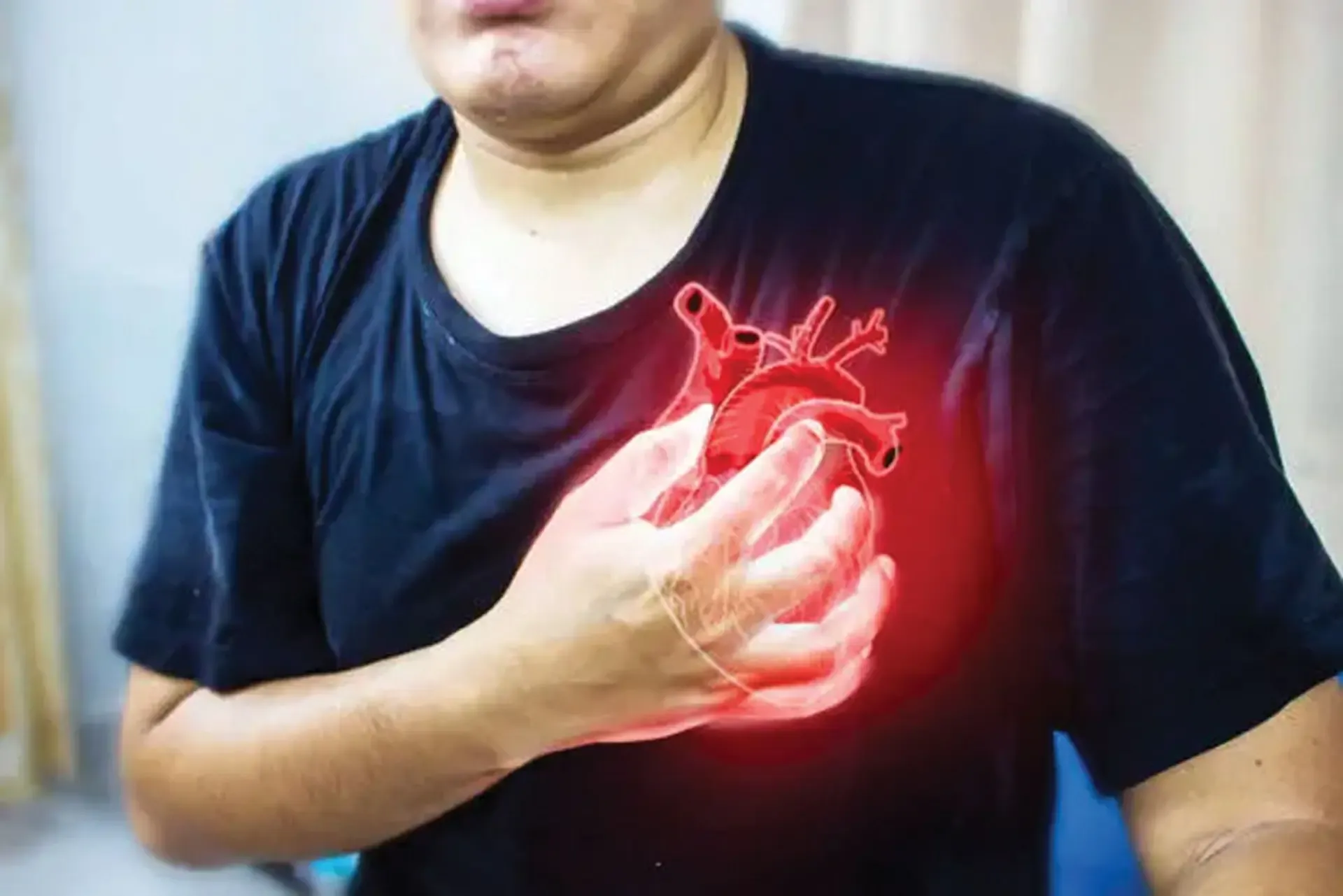NATION — Congestive heart failure (CHF) is when the heart does not pump blood around the body efficiently. This can cause symptoms such as lung congestion and swelling due to fluid retention.
The body relies on the pumping action of the heart to deliver nutrient- and oxygen-rich blood to each of its cells. In congestive heart failure (CHF), the heart cannot pump blood effectively, and the cells do not receive adequate nourishment. As a result, the body cannot function properly.
There is usually no cure for CHF, but with the right treatment, people can often stay active and have a good quality of life.
Prevalence of CHF in the United States
According to the Centers for Disease Control and Prevention (CDC), over 6 million adults in the United States live with heart failure.
CHF can be systolic or diastolic, depending on whether it affects the heart’s ability to contract or relax. This article focuses mainly on systolic CHF and its causes, symptoms, types, and treatment.
What is Congestive Heart Failure?
CHF results when damage to the heart means it no longer works as effectively as it should to pump blood around the body.
If the heart becomes weakened and cannot supply the cells with sufficient blood, it can lead to fatigue, breathlessness, and swelling due to fluid retention.
Everyday activities that used to be easy may become challenging.
Related Heart Conditions
In exploring the characteristics of heart failure, it can help to have a clear understanding of related issues, including:
- Heart Attack: This event involves damage to the heart muscle. It can result from the blockage of a coronary artery, which supplies blood to the heart.
- Systolic Heart Failure: This means that the heart muscle cannot pump blood around the body properly.
- Cardiac Arrest: This happens when the heart and blood circulation both stop, and the person has no pulse.
Stages of Congestive Heart Failure
The stages of heart failure are:
- Stage A: A person has not yet developed heart failure but has a higher risk due to one or more preexisting conditions, such as high blood pressure, coronary artery disease, or diabetes.
- Stage B: A person has not developed heart failure or symptoms but has received a diagnosis of structural heart disease.
- Stage C: A person has ongoing or past symptoms of heart failure and currently has structural heart disease that needs advanced treatment.
- Stage D: A person has advanced heart failure that needs advanced treatment.
Symptoms of CHF
The following are possible symptoms of heart failure:
- Congestion in the Lungs: Fluid builds up in the lungs and causes shortness of breath, even when a person is resting, and particularly when they are lying down. It can also cause a dry, hacking cough.
- Fluid Retention: Less blood reaches the kidneys, which can result in water retention and can cause swelling of the ankles, legs, and abdomen. It can also cause weight gain.
- Fatigue and Dizziness: A reduction in the amount of blood reaching the brain and other organs can cause weakness, dizziness, and confusion.
- Irregular and Rapid Heartbeats: The heart may pump more quickly to try to counteract the lower volume of blood that it pumps out with each contraction. It may also activate stress receptors in the body, increasing the release of stress hormones.
Treatment for CHF
Damage that affects the heart’s pumping action is not always reversible. Nevertheless, treatments can significantly improve quality of life by keeping heart failure under control and helping to relieve many of the symptoms. Treatment can also prevent the progression of heart failure.
Doctors also focus on treating the cause of heart failure. This will reduce the burden on the heart.
Common Treatments for Heart Failure:
- Medications:
- Beta-blockers
- Angiotensin-converting enzyme inhibitors (ACE-inhibitors)
- Angiotensin receptor blockers (ARBs)
- Aldosterone antagonists
- Diuretics
- Surgery:
- Coronary Artery Bypass Graft: A procedure commonly recommended when coronary artery disease is the cause of CHF.
- Percutaneous Coronary Intervention: A nonsurgical procedure to place a stent in the heart to open up the blood vessels.
- Pacemaker: A small device that helps correct an irregular heartbeat.
- Cardiac Ablation: Corrects heart rhythm problems by inserting a catheter into the arteries or veins.
- Heart Valve Surgery: Repairs a defective valve that makes the heart pump inefficiently.
- Implantable Left Ventricular Assist Device: Helps the heart pump blood, used for advanced heart failure.
- Heart Transplant: A potential option for individuals with advanced heart failure when no other treatments work.
Causes of Systolic Heart Failure
Any condition that damages the heart muscle can cause systolic heart failure. These conditions include:
- Coronary Artery Disease: Blocked or narrowed arteries prevent the heart from getting the blood it needs.
- Heart Attack: Damage to the heart muscle due to blockage of the coronary arteries.
- Nonischemic Cardiomyopathy: Weakening of the heart muscle from causes other than a blockage, such as genetic conditions or infections.
- Conditions that Overwork the Heart: These include valve disease, high blood pressure, diabetes, kidney disease, sleep apnea, and heart arrhythmias.
Types of Heart Failure
Heart failure can be categorized based on how it affects the heart:
- Systolic Heart Failure: The heart cannot pump efficiently after filling with blood, often occurring when one or both sides of the heart become weak or enlarged.
- Symptoms: Weakness, cough, fatigue, swelling, and bluish lips and fingers.
- Diastolic Heart Failure: The heart muscle is stiffer than usual and does not relax properly, causing increased pressure and fluid backup.
- Symptoms: Shortness of breath with physical activity, swelling in the legs, fatigue, and shortness of breath while lying down.
Diagnosis of Heart Failure
To diagnose heart failure, doctors may recommend the following tests:
- Blood and Urine Tests: Check for blood count, kidney and liver function, and specific heart failure markers.
- Chest X-ray: Shows whether the heart is enlarged and if fluid is in the lungs.
- Electrocardiogram: Records the heart’s electrical activity and rhythms.
- Echocardiogram: Shows the heart’s pumping action and ejection fraction (the amount of blood the left ventricle pumps with each beat).
Other tests may include stress tests, cardiac MRIs, CT scans, PET scans, and angiograms.
Risk Factors for CHF
CHF can be influenced by several risk factors, including:
- Diabetes
- Obesity
- Smoking
- High alcohol intake
- Anemia
- Thyroid problems
- Lupus
- Myocarditis
- Heart arrhythmias
- Atrial fibrillation
Prevention and Management of CHF
Lifestyle changes can reduce the risk of heart failure or slow its progression:
- Stop smoking.
- Eat a healthy diet rich in fruits, vegetables, and whole grains.
- Exercise regularly.
- Maintain a moderate weight.
- Limit alcohol intake.
- Reduce stress.
- Get enough quality sleep.
- Keep up with vaccinations, including the flu shot.
Outlook and Life Expectancy with CHF
CHF can be life-threatening, but the outlook depends on the type, cause, and stage of heart failure. The presence of other health conditions or complications can also affect life expectancy and quality of life.
Frequently Asked Questions
- What is the life expectancy of a person with CHF? It depends on the type and stage of CHF, as well as individual health factors. Around 50% of people with CHF are likely to live another 5 years or more.
- Is congestive heart failure serious? Yes, it is considered a serious condition, but with treatment, many people can continue to function and maintain a good quality of life.
- What are the signs of congestive heart failure? Common signs include coughing, wheezing, shortness of breath, swelling, and fatigue.
Summary
CHF affects millions of people in the U.S. While it is often not reversible, treatments can help alleviate symptoms and improve quality of life. Anyone experiencing symptoms of heart failure should consult a doctor for diagnosis and treatment.
— Tim Newman









